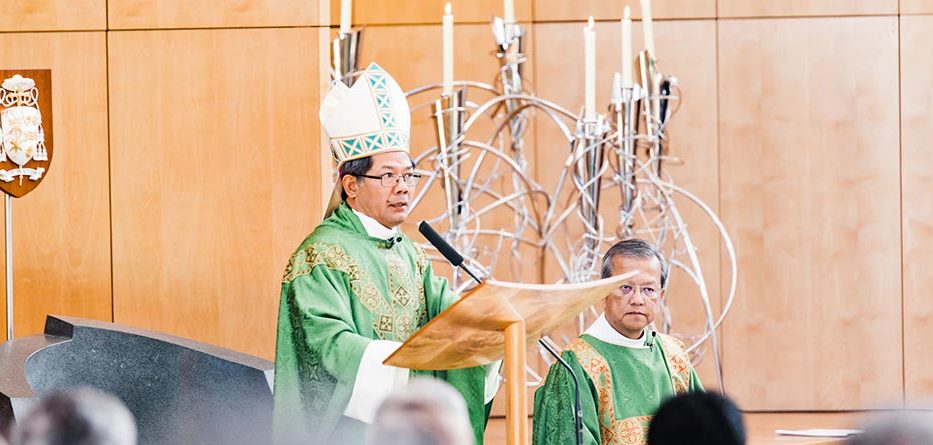Most Reverend Vincent Long Van Nguyen OFM Conv DD STL, Bishop of Parramatta
Homily for the 30th Sunday in Ordinary Time Year A 2017 at St Raphael’s German Chaplaincy, Blacktown
29 October 2017
Dear friends,
It is a great joy and honour for me to join you, the German Catholic Community, in celebrating the feast of your patron, St. Raphael, which coincides with the anniversary of the dedication of your beautiful church. May this centre continue to be a place of vibrant worship, solidarity and mission as you maintain and foster your traditions in your adopted homeland.
Australia has been greatly blessed with the unique German attributes that are admired throughout the world, besides your individual gifts and talents. Likewise, the Church has also been enriched by your faith often tried and tested in hardship and adversity. Migrants and refugees have been the strength of the Church and society for these reasons. Let us as living testament to the free and fair spirit of Australia remind fellow Australians what this great country can be and should be amidst the politics of fear and indifference today.
The Word of God this Sunday speaks to us about the importance of being a community of faith, which is countercultural or antithetical to the dominant social system. God, in Christ, summons us to live and relate to each other in a way that is different to the kind of ruthless, competitive, inhumane, dog eat dog, survival of the fittest economy that we are being seduced into. We are called to practice an ethic of concern, care, support for one another, so no one is excluded from the table or left behind; we are challenged to be a community of hospitality, compassion and neighbourliness, which is an alternative model to the economy of extraction, self-interest and accumulation.
In the first reading, we hear how the children of Israel receive instructions as to how they should live and behave towards each other. The God who liberated them says: “You must not molest the stranger or oppress him, for you lived as strangers in the land of Egypt”. Israelites knew what it was like to be on the margins of society, what it was like to be in a position of vulnerability because of their being a minority group, social status and ethnicity. Now, they must show understanding, compassion and empathy towards others who are in similar situations: the strangers, the widows, the orphans, the poor and those in debt.
In effect, they are exhorted not to be a society of enslavement and oppression that they themselves experienced in Egypt. Instead they are to form a post-exodus society, which would be the model for all the nations. This new society would be marked by concern for the common good and special attention to the most vulnerable. The Israelites learn to be good neighbours to one another, to be in solidarity with other people and even to go beyond themselves.
This is also fundamentally the message of Jesus. Last Sunday, he was asked the tricky question regarding taxes to Caesar. His reply is simple and yet radical: “Render to Caesar what belongs to Caesar and to God what belongs to God”. In other words, the duty of Israelites is to build God’s kingdom of justice, love and compassion as a contrast society to Caesar’s exploitative, ruthless and oppressive Roman Empire. In today’s Gospel, Jesus defines that same vision of God’s kingdom in terms of loving God and neighbour. He gives us a new understanding of the Old Testament teachings – one that is rooted in radical love rather than the meticulous observance of the law.
Jesus would later expand the notion of a neighbour to include not only three classic outsiders: the widow, the orphan and the stranger, but also anyone who was excluded from total acceptance. The Samaritan parable would redefine who the neighbour was and challenge Israelites even more deeply in terms of their attitudes, actions and relationships with those outside their circle. Through the parable, Jesus would push the boundaries of their acceptance, inclusion and love to the limits. In identifying himself with the marginalised and outcast, Jesus would challenge them with a radical new way of seeing, acting and relating.
Dear friends,
The early Christians understood the significance of being fundamentally countercultural in how they lived, how they related, how they shared resources with the disadvantaged. In the second reading, Paul acknowledges the Thessalonians for their faith and love for outsiders. “They broke with idolatry and became servants of the real, living God”. They embraced a life of faith, hope and love in contrast to their pagan counterparts. They reached out to others beyond their borders.
Similarly, we are challenged to be a kinder, more inclusive, more caring alternative society under God’s rule. The kingdom vision of Jesus guides us as we endeavour to be a community that serves as an antidote to the politics of fear and the economy of exclusion in our society. May we who have been shown immeasurable love in Christ reach out in the spirit of neighbourliness to the unloved, the excluded, the disadvantaged and the dispossessed, in order to bring them to the table of the Lord.








